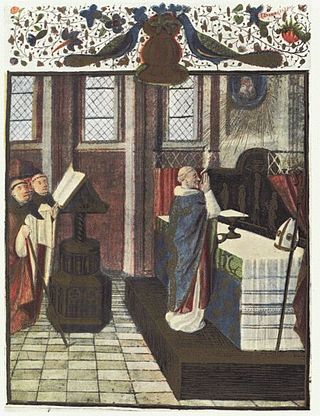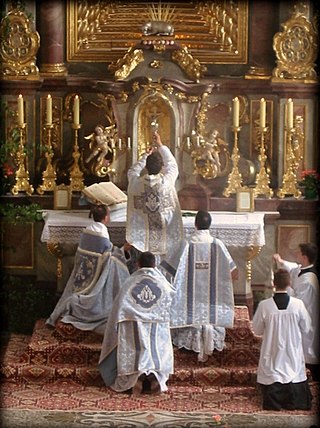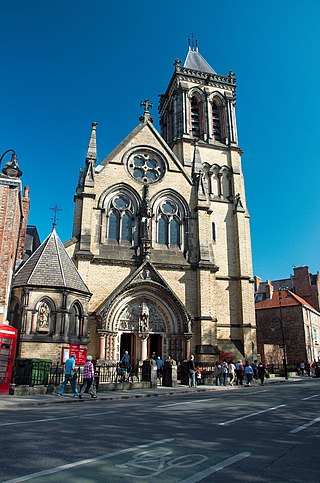
Mass is the main Eucharistic liturgical service in many forms of Western Christianity. The term Mass is commonly used in the Catholic Church, Western Rite Orthodoxy, Old Catholicism, and Independent Catholicism. The term is also used in many Lutheran churches, as well as in some Anglican churches, and on rare occasion by other Protestant churches.
In the liturgical calendar of the Roman Rite, a solemnity is a feast day of the highest rank celebrating a mystery of faith such as the Trinity, an event in the life of Jesus, his mother Mary, his earthly father Joseph, or another important saint. The observance begins with the vigil on the evening before the actual date of the feast. Unlike feast days of the rank of feast or those of the rank of memorial, solemnities replace the celebration of Sundays outside Advent, Lent, and Easter.

The Tridentine Mass, also known as the Traditional Latin Mass or the Traditional Rite, is the liturgy in the Roman Missal of the Catholic Church codified in 1570 and published thereafter with amendments up to 1962. Celebrated almost exclusively in Ecclesiastical Latin, it was the most widely used Eucharistic liturgy in the world from its issuance in 1570 until the introduction of the Mass of Paul VI.

The Te Deum is a Latin Christian hymn traditionally ascribed to a date before AD 500, but perhaps with antecedents that place it much earlier. It is central to the Ambrosian hymnal, which spread throughout the Latin Church with other parts of the Ambrosian Rite of Milan in the 6th to 8th centuries. It is sometimes known as the Ambrosian Hymn, although authorship by Saint Ambrose is unlikely. The term Te Deum can also refer to a short religious service that is based upon the hymn.

The Feast of Corpus Christi, also known as the Solemnity of the Most Holy Body and Blood of Christ, is a liturgical solemnity celebrating the real presence of Christ in the Eucharist; the feast is observed by the Latin Church, in addition to certain Western Orthodox, Lutheran, and Anglican churches. Two months earlier, the institution of the Eucharist at the Last Supper is observed on Maundy Thursday in a sombre atmosphere leading to Good Friday. The liturgy on that day also commemorates Christ's washing of the disciples' feet, the institution of the priesthood, and the agony in the Garden of Gethsemane.

"Gloria in excelsis Deo" is a Christian hymn known also as the Greater Doxology and the Angelic Hymn/Hymn of the Angels. The name is often abbreviated to Gloria in Excelsis or simply Gloria.
Litany, in Christian worship and some forms of Jewish worship, is a form of prayer used in services and processions, and consisting of a number of petitions. The word comes through Latin litania from Ancient Greek λιτανεία (litaneía), which in turn comes from λιτή (litḗ), meaning "prayer, supplication".

The gradual is a certain chant or hymn in liturgical Christian worship. It is practiced in the Catholic Mass, Lutheran Divine Service, Anglican service and other traditions. It gets its name from the Latin gradus because it was once chanted on the step of the ambo or altar. It is customarily placed after a reading of scripture.

The Introit is part of the opening of the liturgical celebration of the Eucharist for many Christian denominations. In its most complete version, it consists of an antiphon, psalm verse and Gloria Patri, which are spoken or sung at the beginning of the celebration. It is part of the proper of the liturgy: that is, the part that changes over the liturgical year.
The Litany of the Saints is a formal prayer of the Roman Catholic Church as well as the Old Catholic Church, Lutheran congregations of Evangelical Catholic churchmanship, Anglican congregations of Anglo-Catholic churchmanship, and Western Rite Orthodox communities. It is a prayer to the Triune God, which also includes invocations for the intercession of the Blessed Virgin Mary, the Angels and all the martyrs and saints upon whom Christianity was founded, and those recognised as saints through the subsequent history of the church. Following the invocation of the saints, the Litany concludes with a series of supplications to God to hear the prayers of the worshippers. It is most prominently sung during the Easter Vigil, All Saints' Day, and in the liturgy for conferring Holy Orders, the Consecration of a Virgin and reception of the perpetual vows of a religious or a diocesane hermit.
The ordinary, in Catholic liturgies, refers to the part of the Mass or of the canonical hours that is reasonably constant without regard to the date on which the service is performed. It is contrasted to the proper, which is that part of these liturgies that varies according to the date, either representing an observance within the liturgical year, or of a particular saint or significant event, or to the common which contains those parts that are common to an entire category of saints such as apostles or martyrs.

The Roman Rite is the most common ritual family for performing the ecclesiastical services of the Latin Church, the largest of the sui iuris particular churches that comprise the Catholic Church. The Roman Rite governs rites such as the Roman Mass and the Liturgy of the Hours as well as the manner in which sacraments and blessings are performed.

Missa cantata is a form of Tridentine Mass defined officially in 1960 as a sung Mass celebrated without sacred ministers, i.e., deacon and subdeacon.

Pre-Tridentine Mass refers to the evolving and regional forms of the Catholic Mass in the West from antiquity to 1570. The basic structure solidified early and has been preserved, as well as important prayers such as the Roman Canon.
A Catholic order liturgical rite is a variant of a Catholic liturgical rite distinct from the typical ones, such as the Roman Rite, but instead specific to a certain Catholic religious order.

The Oratory Church of Saint Wilfrid, York is a Catholic church in York, England.

The Mass is the central liturgical service of the Eucharist in the Catholic Church, in which bread and wine are consecrated and become the body and blood of Christ. As defined by the Church at the Council of Trent, in the Mass "the same Christ who offered himself once in a bloody manner on the altar of the cross, is present and offered in an unbloody manner". The Church describes the Mass as the "source and summit of the Christian life", and teaches that the Mass is a sacrifice, in which the sacramental bread and wine, through consecration by an ordained priest, become the sacrificial body, blood, soul, and divinity of Christ as the sacrifice on Calvary made truly present once again on the altar. The Catholic Church permits only baptised members in the state of grace to receive Christ in the Eucharist.
Quo primum is the incipit of an Apostolic constitution in the form of a papal bull issued by Pope Pius V on 14 July 1570. It promulgated the Roman Missal, and made its use obligatory throughout the Latin Church of the Catholic Church, except where there existed a different Mass liturgy of the Latin Church of at least two hundred years standing.
The Church of the Ascension is an Anglo-Catholic parish in the Episcopal Diocese of Chicago. Founded in 1857 as a mission of St. James Church, it is now located on North La Salle Drive on Chicago's Near North Side. The church became a part of the Anglo-Catholic movement in 1869. The principal service on Sunday is the Solemn High Mass celebrated at 11 a.m., according to Rite II in the Episcopal Church's Book of Common Prayer (1979). This Mass is celebrated at the High Altar, and includes three sacred ministers, many acolytes, incense, and music provided by a professional choir. The mass includes processions and other devotions on certain feasts and holy days.

"Rorate caeli" or "Rorate coeli" are the opening words of Isaiah 45:8 in the Vulgate. The text appears at several points in the Christian liturgy of the Western Church during Advent.















